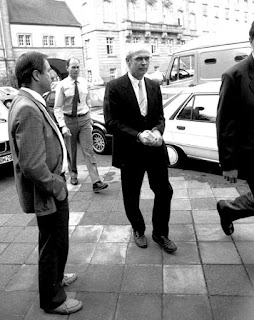Steve Keller Comment to Ulrich Boser Interview 3/24/09
This is a comment posted to a Boston Phoenix March 24, 2009 interview of The Gardner Heist author Ulrich Boser by Steve Keller. Keller. Keller was a security consultant for the Gardner Museum at the time of the robbery and his work in that role is describe in both Boser's work as well as Master Thieve's by Stephen Kurkjian Some text bolded is by me for emphasis.
Re: Interview:
Ulrich Boser
Regarding the
question about whether the guard could have defeated the motion detectors and
whether the guard could have gotten past it, I want to comment. I was the
security consultant to the museum prior to the theft and had made
recommendations for security improvements which the museum intended to correct
in an upcoming renovation that subsequently did not occur due to the theft. I
was called in to talk to the FBI briefly (in spite of the fact that they were
not at all interested in talking to me). My firm consults with hundreds of
museums, designs high tech security systems for museums, I was very familiar
with the brand of security system the museum used, and had extensive experience
in testing alarm systems for museums. During my visit to the museum after the
theft, I tested the two motion detectors that were involved in the protection
of the Manet and could not get past them. I crawled on my belly on the floor,
moved at varying speeds during different tests, crawled under tables, and tried
every trick I knew and the detectors caught me every time. I new the detector
model to be state of the art at the time and highly reliable and I asked the
manufacturer what the mathematical chance that they had failed momentarily
could be. I don't recall the numbers but they were well over one in a million.
This means that someone would have to have defeated one detector twice (in and
out) or two detectors once each (pass through one door and out another). It
seems to me that defeating the detectors would be virtually impossible.Knowing
what I know about detectors in general I can say that the guard could not have
defeated the detector by any known means such as masking them without
activating the detector in doing so or in removing the mask from the device or
leaving evidence which I did not find. The detectors were electronically
supervised so disconnection was not possible without causing an alarm. Turning
them off would create a record.
Nevertheless, someone entered the room and removed a painting. This
tells me that it possibly had been removed by someone before the alarms were
activated or by a guard who was authorized to move through the gallery on
patrol although I have no knowledge as to whether this happened and am not
making accusations or implying guilt of anyone.I have always felt that this was
an inside job. I have my own idea of who did it, or at least who on the
museum's staff could have been involved but I was never given an opportunity to
learn enough inside facts to know if my theory is possible or not. Since I
can't prove my theory I can't say more. But I feel that if the FBI interviewed
everyone as poorly as they interviewed me, it's no wonder this remains
unsolved. As a former police Detective in a major city and someone who knew
infinitey more than they did about art crimes, I felt that they were not
interested in what I might be able to tell them because they knew it all
already. This may be unfair to the investigative team in general but when I
offered my theory they simply told me that it was not possible and had been
ruled out. As I recall, they cited polygraph evidence to discount my theory and
just blew off my other advice and questions.
Which guard patrolled and which sat at the desk monitoring alarms and
CCTV? Which guard was tied up most distant from the exit door and which was
tied up nearest the exit door and might have actually exited during the theft
to help the crooks? Which guard passed the polygraph exam and which, if any,
had a questionable exam? Are there any common denominators here? I don't know.
I'm just asking. Did one guard fit the "profile" of a guard and one
did not, such as being overqualified? Again, I don't know but it would be interesting
to explore these questions. If the guards are innocent they deserve to have
their names cleared. Finally, I do not believe in the Dr. No Theory. Certainly
it is possible but I feel it is unlikely. People steal masterpieces primarily
for one reason--to extort them back to the museum or insurer, the one thing
they really couldn't do in this case until much too late to not get caught. Art
criminals hope that the theft will be kept secret until they sell the art back
to the museum for a ransom in a quick quiet transaction. In nearly every major art theft I have been
involved with, someone who was not involved tried to scam the museum into
giving them money even though they didn't have the art. It is common. Good
interview. I plan to read the book. Steve Keller Certified Protection
Professional


